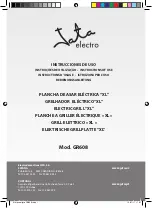
5
www.combisteel.com
Be sure to read the user manual before starting to operate the appliance and keep it for reference when you
need it. Manufacturer company does not assume responsibility for any operation carried out without complying
with the user manual, and any final damages to any person or property caused by maintenance or technical
interventions not carried out by authorized technicians.
These instructions apply only if the country code is shown on the appliance. If the country code is not shown on
the appliance, refer to the necessary technical instructions for adapting the appliance to the current conditions
in the country.
1. ASSEMBLY
•
Assembly of the appliance, gas connection and conversion to different gasses, electrical installation should
be made according to the local standards by specialist personnel based on the tables of Table-2 and Table-3
•
Place the appliance by leveling it on a suitable counter.
•
Place the appliance under a chimney hood or in an ambient where adequate ventilation can be carried out
so that the smoke and odor can be removed.
WARNING: The appliance should be placed min. 25-30cm away from rear and side walls to prevent excessive
heat increases. If the appliance is installed next to decorative coatings of kitchen furniture etc., it is
recommended that they have been made of non-combustible material; otherwise, they should be coated with a
non-combustible, heat-insulating material, and the fire protection instructions should be strictly observed.
2. GAS CONNECTION
•
Gas leak should be checked in the gas connections before operating the appliance. Use soap foam or other
suitable foam for this purpose.
•
The gas type and pressure at which the appliance is set are indicated on the appliance and on the packaging
label.
•
After the gas connection, the gas inlet pressure should be in accordance with the values given in the table.
•
Make sure that your appliance is adapted to the gas you will use. If not, the injector should be replaced.
3. ADAPTATION IN DIFFERENT GAS TYPES
•
Disassemble the injector on the radiant.
•
Select the suitable injector for the type and pressure of the gas to be used from the gas conversion Table-2
and Table-3 and replace the disassembled injector.
•
Injector and bypass injector diameters are printed on the injector.
•
After adapting your appliance to a gas type other than the manufacturer's gas type, it is necessary to remove
the existing label and stick the label printed according to the new gas type.
•
Remove the gas valve switch.
•
Disassemble the by-pass injector on the gas valve.
•
Assemble the by-pass injector suitable for the new gas type.
•
Refit the gas valve switch.
4. USER INSTRUCTION
•
Before the appliance is operated for the first time, it should be disconnected and cleaned with warm soapy
water.
•
Water should never be spilled or poured on the appliance.
•
The radiants can be controlled separately, and turn on the radiants according to the size of the food.





































